New supported platforms
- x86-64 (64-bit Linux on AMD64 and Intel Xeon (EM64T) processors)
- IA-64 (Itanium-II support running with HP-UX-11)
- Solaris 10 (SPARC/Opteron)
- Mac OS X 10.4 (PowerPC/Intel)
- Windows 2000 or 2003 Server
Notification Server
The Notification Server system consists of the “notifysrv” program. “notifysrv” receives events from local client processes and tools, and forwards them to processes which have registered to receive them. “notifysrv” is a lightweight service with excellent performance in delivering messages fast and reliably, without blocking the sender or receiver processes, and without polling.
This new service is used e.g. by HELIOS Admin to provide real-time updates to print queues and log file windows. This ensures that views are always up-to-date, even as the observed data changes.
Authentication Server
The authentication server is a new foundation service providing login authorization and user credential information for all HELIOS servers and tools. It supports local host users, LDAP*, NIS and Windows AD/PDC user settings and passwords for all HELIOS services and tools (see “HELIOS adds AD/PDC group membership support” for details). This makes it much easier to deploy HELIOS applications in enterprise, university, and government sites, and to integrate with existing directory services.
* LDAP is not supported in the first HELIOS UB release. It will be made available via a future update.
This new component administers login and authentication processes for all HELIOS services:
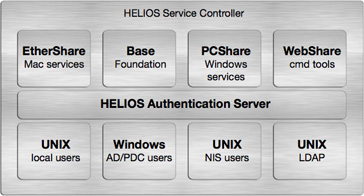
Example of an authentication server workflow:
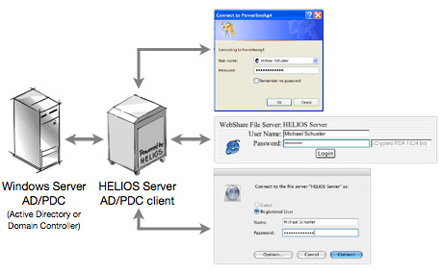
“authutil” tool
A new utility to query user accounts from the authentication server, e.g. uid, gid, groups membership. It allows verifying user names and passwords, setting or changing passwords, or generating MD5 WebShare virtual user passwords, and facilitates interactive or scripted queries. Local host users, AD/PDC, NIS and LDAP accounts are supported according to the authentication server enabled systems.
Automatic backup of system configuration
The system configuration in “var/conf” and “var/spool/qmeta” (printer queues) is automatically saved daily in a “tar” file. This allows restoring old settings, e.g. if the preferences file has accidentally been deleted.
HELIOS Admin
This administration service is comprised of two components:
HELIOS Admin Server
The server component which is supported on all platforms.
HELIOS Admin Client
Similar to EtherShare Admin and PCShare Admin, the HELIOS Admin client is a convenient tool that allows configuring users, groups, volumes, printer queues, etc. Server settings for the HELIOS Admin Server can also be specified from the HELIOS Admin client:
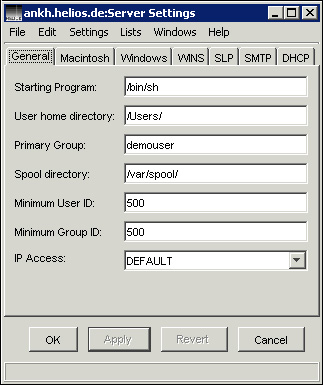
HELIOS Admin was designed for cross-platform use. It can be installed on Windows, Macintosh, Linux and UNIX machines. Also, it uses the TCP/IP protocol which enables remote administration via HTTP:
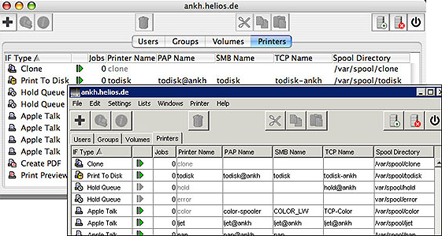
Print Server
The existing BSD lpd/lpr based print server is completely replaced by the new HELIOS advanced printing system which is 64-bit compatible, uses UTF-8 job names, supports print event notification, fast job enumeration and supports HELIOS process auditing and tracing. The old 999 job limit per queue has been removed. All common printing features are provided by the HELIOS printing library which is used by HELIOS applications. e.g. HELIOS Admin.
Printing daemon and tools are command compatible with BSD lpd, lpc, lpr, lprm, lpq tools. Additional “lpc” commands allow copying, moving and re-ordering print jobs.
“socket” utility
This new tool is a “telnet” like connection program to TCP/IP ports. For example, this utility is suited for debugging TCP/IP connection availability.
“dt tools”
The “dt tools” are file system compatible commands (copy / move / remove / rename / ...) that properly handle and preserve Mac resource fork and Finder info. The “dt tools” now also fully support NTFS file streams, for unique cross-platform UNIX / Windows / Mac file support. Ideal for scripted workflows.
ICC profiles
The HELIOS ICC profiles library has been updated. Additional profiles such as ECI-RGB provide a higher compatibility with more standards.
“mail” tool
A new SMTP mail client tool which is based upon HELIOS libraries, and therefore works independently as an SMTP client. A local host configured mail server is not needed anymore, just the configuration of a valid SMTP server address. All HELIOS services use the built-in SMTP client support.
“srvmsg” tool
“srvmsg” is a utility to send messages to one or more user(s). It replaces the “afpmsg” and “pcsmsg” tool. “srvmsg” can also be used for auditing and tracing of HELIOS processes on production servers:
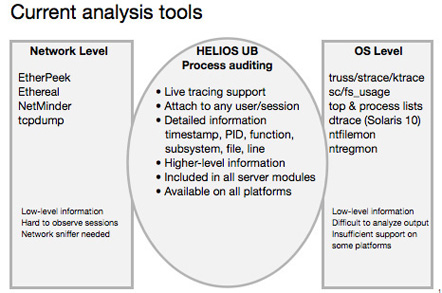
Advantages:
- Very valuable tool for enterprise sites
- Helps pinpoint source/nature of problems
- Allows easier problem diagnosis/solution
- Can audit any process/user session
- Complementary with network and OS tracing
“psyslog” tool
“psyslog” is a tool to browse syslog entries. Records will be read from syslog files which are defined in “/etc/syslog.conf”. All records will be mixed to one list so that records appear in chronological order.
“serverlog” and “printerlog” scripts
“serverlog” and “printerlog” are tools to browse the “server.acct” and “printer.acct” files in “HELIOSDIR/var/adm” in a human readable form.
HELIOS “htar” archive program (“tar”-compatible)
Allows creating and restoring “tar” archives. Unique benefits are:
- Built-in “gzip”- or “compress”-compatible compression (no 4 GB limit for archives)
- Unicode/UTF-8 file name support
- Mac resource and Finder info support
- Windows file streams support
- File/directory ID support
- Upcoming “htar” for Windows allows data migration between UNIX/Windows


 Enterprise Server
Enterprise Server
 Developers / SDK
Developers / SDK
 Retail / Industrial
Retail / Industrial
 Newspapers / Publishers
Newspapers / Publishers
 Photographer / Studios
Photographer / Studios
 Ad Agencies / Premedia / Printers
Ad Agencies / Premedia / Printers
 Video & Entertainment
Video & Entertainment
 Cloud Collaboration
Cloud Collaboration
 HD Color
HD Color
 Image Processing
Image Processing
 Proofing
Proofing
 WebShare Connectivity
WebShare Connectivity
 Workflow Automation
Workflow Automation
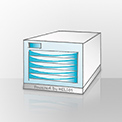 File Server
File Server
 Press Releases
Press Releases  Videos
Videos  Newsletters
Newsletters  Events
Events